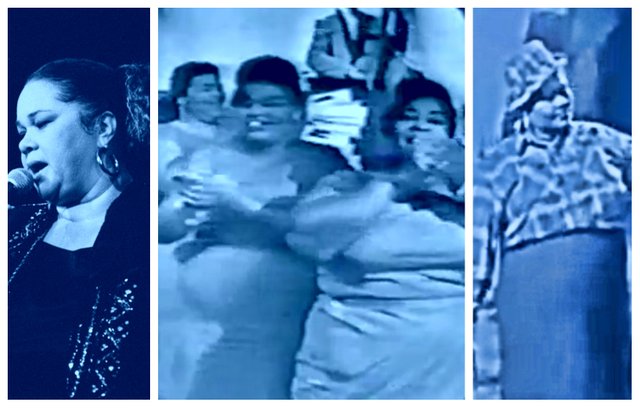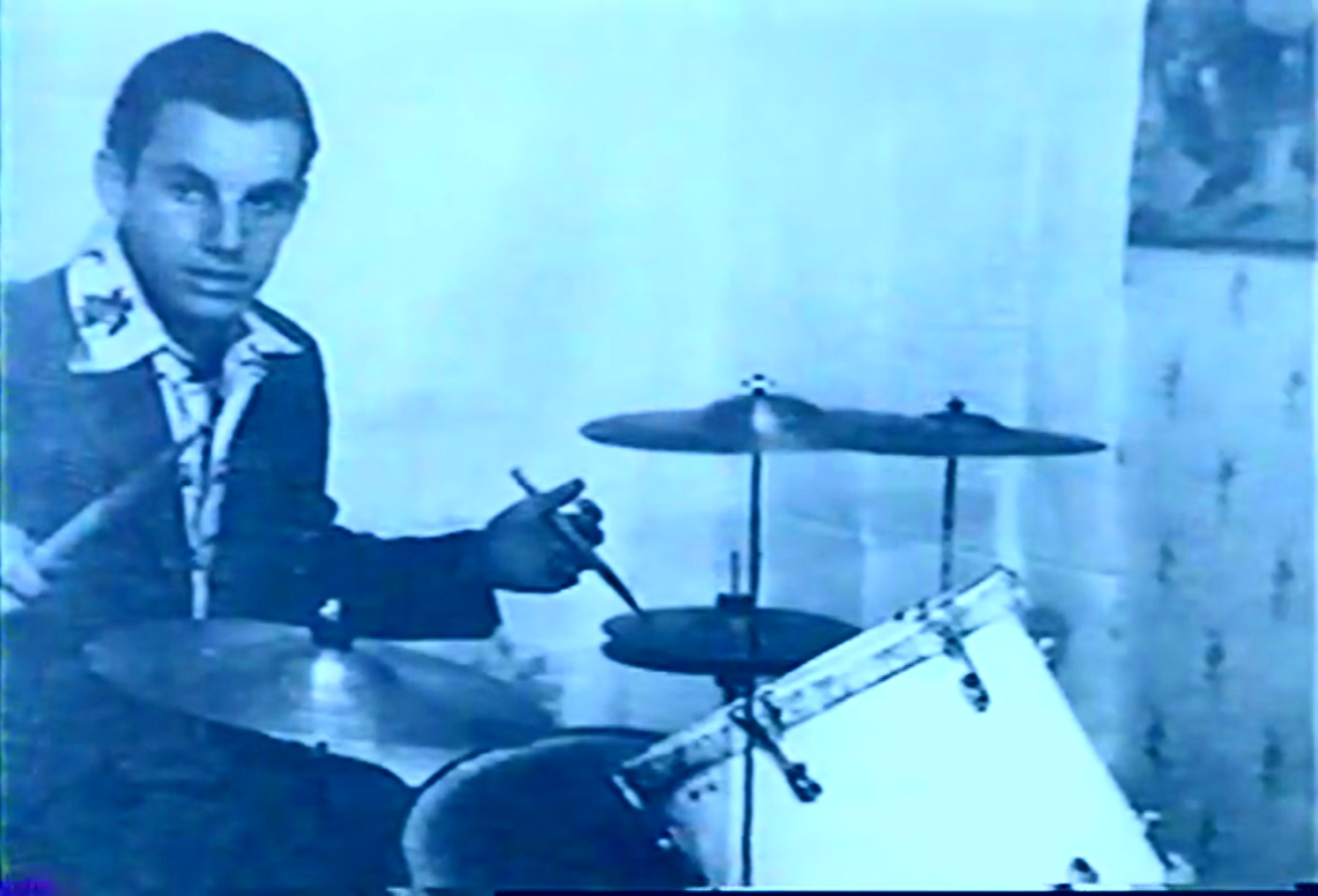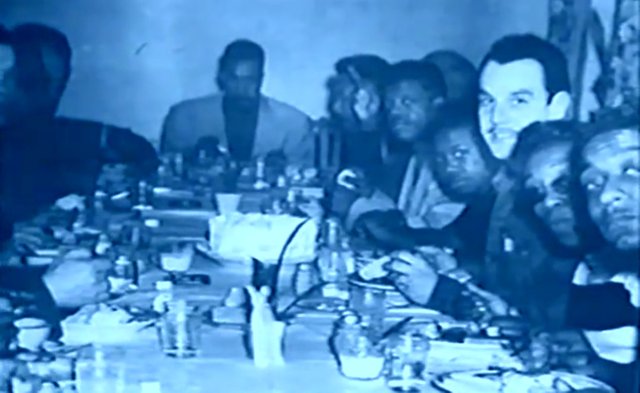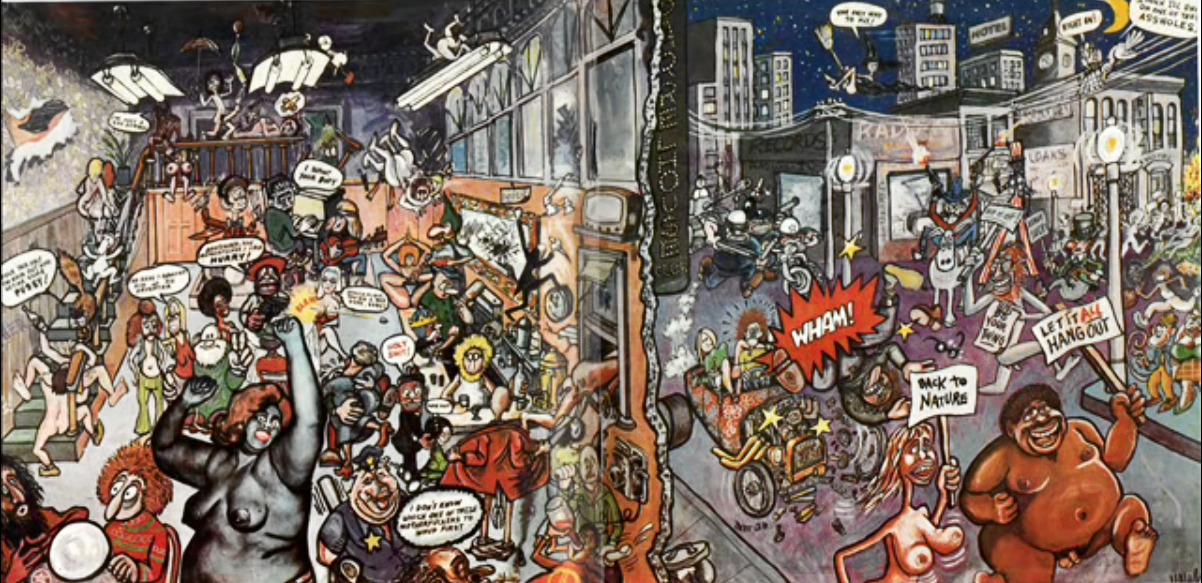Big Mamas & Johnny Otis
The story of the Unsung Hero Johnny Otis continues.

From my previous post:
In the 1930s, long before it was a “thing” to self-identify, or cool to be black, Johnny Otis decided to live life as a black man. He was the son of Greek immigrants who had a neighborhood grocery store in a predominantly black neighborhood in Berkley, California. What a fascinating and impactful life! He was a musician, composer, arranger, bandleader, singer, disc jockey, record producer, TV show host, artist, author, and impresario -- and as you'll learn in the next post, he was an amazing talent scout.
Talent Scout
Johnny Otis wasn't your everyday talent scout. Why? As you read above, he had multiple careers going at the same time and it was a self reinforcing synergistic loop. I listed one of his careers as "impresario" and these are all synonyms for impresario: showman, promoter, booker, and booking agent. Johnny Otis was all of these things. In addition, in 1948 in the Watts neighborhood of Los Angeles he opened an important R&B club, The Barrelhouse Club.
So he had his own club, his own band, his own radio show, and for eight years his own local TV show in Los Angeles. Thus he would have booked unknown acts, snatched promising singers for his own band and records, produced the records, and played them on the radio and TV. On top of that, he was a musician, composer and arranger, so he knew music and recognized talent.
Hound Dog
Most people know the song "Hound Dog" from the classic rock and roll version by Elvis. But far less people know if from the original blues version by Big Mama Thorton which she recorded back in 1952!
The song was written by the incredibly successful song writing team of Jerry Leiber and Mike Stoller, but the twist is that they were only 19 years old and just starting out when it was written. Johnny Otis was a bandleader and Big Mama Thorton was his singer at the time. He invited Jerry Leiber and Mike Stoller to his house to meet her.
Leiber recalled: "We saw Big Mama and she knocked me cold. She looked like the biggest, baddest, saltiest chick you would ever see. And she was mean, a 'lady bear,' as they used to call 'em. She must have been 350 pounds, and she had all these scars all over her face conveying words which could not be sung. But how to do it without actually saying it? And how to do it telling a story? I couldn't just have a song full of expletives."
Source: David Fricke, "Leiber and Stoller: Rolling Stone's 1990 Interview With the Songwriting Legends", Rolling Stone (April 19, 1990; reprinted: August 22, 2011)
Johnny Otis also played drums on the recording.
 The rest, as they say is history.
The rest, as they say is history.
In 1965, 23 years later, Big Mama was on German TV singing Hound Dog with Buddy Guy on guitar.
Etta James
Johnny Otis discovered Etta James when she was only 15 years old. She is one of the best, if not the best, female R&B singers in living memory. Many of you will know her from her huge hit At Last
She was incredibly versatile, here is a killer blues rocker she did when she was 50.
Etta James and Johnny Otis at the Rock & Roll Hall of Fame
Little Esther Phillips
She was another one of the singers Johnny Otis discovered, and he produced a string of hit records with her.
Jackie Wilson
Another one of the many artist Johnny Otis discovered was big daddy :-) Jackie Wilson. If you're a serious Michael Jackson fan you'll recognize him someone the King of Pop acknowledged as a major influence.
Staying Power
Johnny Otis quit school and began playing drums in a band in the late 1930s, when he was 19 he married a woman who was African America and Filipino.
In 1945 his band had a big hit record with "Harlem Nocturne." It was rather rare for the stars of the big band era to transition successfully into rock and roll, but as noted above, Johnny even made it into the Hall of Fame.
It was also rare for 50s rock and roll stars to stay popular after the British wave hit, which evolved into the Woodstock generation. But again Johnny and his band bucked the trend. On guitar is Shuggy Otis, Johnny Otis and his wife's' son who was born in 1953. He started playing guitar at the age of two, and at age 11 be began playing & recording with his father. Somebody put this Johnny Otis song on a Soul Train video clip and it works quite well.
Johnny Otis - Country Girl
The Johnny Otis Show The Watts Breakaway
The Johnny Otis Band also adapted well to the funk era.
 Although he stuck out a bit when having dinner with his band, Johnny was embraced and accepted as part of the black community. If you're easily triggered, don't listen to the song below -- in any case, it is demonstrative of how comfortable and confident Johnny Otis was with himself and his place in the community he loved. Honestly, it's hard to imagine someone in his position attempting it today.
Although he stuck out a bit when having dinner with his band, Johnny was embraced and accepted as part of the black community. If you're easily triggered, don't listen to the song below -- in any case, it is demonstrative of how comfortable and confident Johnny Otis was with himself and his place in the community he loved. Honestly, it's hard to imagine someone in his position attempting it today.
 Johnny Otis even produced an ADULTS ONLY album back in the Fabulous Freak Brothers era. Normally I wouldn't have mentioned this, but I have a suspicion @katharsisdrill & @shortcut might be interested in this. If you are an adult and want to hear some of it, follow this link warning, not child friendly
Johnny Otis even produced an ADULTS ONLY album back in the Fabulous Freak Brothers era. Normally I wouldn't have mentioned this, but I have a suspicion @katharsisdrill & @shortcut might be interested in this. If you are an adult and want to hear some of it, follow this link warning, not child friendly
Believe it or not, there's so much more about Johnny Otis to discover, happy hunting & thanks for stopping by!
Lead photo is a collage of YouTube screen captures and Etta James from Wiki effects by @roused.
Remaining blue tinted photos are YouTube screen captures

Quite a dude. Thanks for making us aware of him - until this he was just an name I knew, no more than that. Love how even though it's him being honoured in that ceremony, he doesn't talk about himself but makes it about Etta. I wondered about the "live life as a black man thing" and why that was, so looked for him in Jerry Wexler's autobiography ('Rhythm and the blues'). Sure enough, he is included in a list of people Jerry introduces this way:
"The hip of my generation, who were teenagers in the thirties, had always been drawn to black culture. I fact, I had always known White Negroes, not pretenders or voyeurs but guys who had opted to leave the white world, married black women, and made Harlem or Watts their habitat. These guys CONVERTED."
So he wasn't alone. As you say, things are different now, though I suppose the easy relationship Eminem has with his African American peers is no different.
Jerry Wexler's autobiography ('Rhythm and the blues'), that's a book I don't own, but would love to. Atlantic Records was the place for R&B.
Worth looking out for on Amazon, though it's not so cheap; picked mine up from a library sale years ago. A terrific read, going right from his New York childhood through to 1993, when he'd just produced an Etta James record. Ray Charles, Big Joe Turner, Wilson Pickett, Solomon Burke, King Curtis, Dr John, Prof Longhair, Donny Hathaway, Dylan, on and on - guy worked with them all. The stuff about the 'I never loved a man' Aretha sessions is one of the highlights.
@shortcut mentioned you to me, btw, and the fact that you write for all about jazz.com. I sent him the draft of the book I've been researching and writing for the last 3 years on the PREhistory of jazz. I've had to park it because the money ran out and the crypto market (having got in at the top) has so far failed to be my salvation.
Keep it coming. Good to know there's some genuinely interesting music content on the platform. Hope to be adding to it myself soon - just nosing around at the moment, finding my feet.
Thanks, glad you're here on the platform. I did an in depth interview with Jerry Jemmott (Atlantic session bassist) and asked him about J. Wexler -- I'm a huge Duane Allman fan, so Jerry W., Thom Dowd and those guys are people I kept up with.
BTW, I wondered if you noticed in the interview clip with Johnny Otis he mentioned where that "shave, and a hair cut" beat came from. I always thought that was a Bo Diddley invention, but although Johnny gave Bo credit, he mentioned that he heard guys on the chain gang back in the 1930s doing a slower version of that beat.
Good luck with your book too!!
Checked you out on All about jazz − your profile and that Jerry Jemmott interview. The people that guy has played with! How cool is the picture of Duane and Jerry with Wexler sat between them? You should definitely get hold of the Wexler book, sounds like it’s right up your alley; Tom Dowd looms large, for instance. I should maybe clarify that I don’t pretend to be very knowledgeable about the whole Southern blues / rock thing (Butterfield, Bloomfield et al), but as an amateur musicologist there’s nothing I don’t regard as grist to my mill, so I have a working knowledge of a vast amount of stuff from 12th century organum to Ariana Grande. Your own tastes are clearly pretty eclectic: saw you namecheck Debashish Bhattacharya, who your average rock journalist mightn’t know. I liked your story about Duke's open-mindedness: what a dude he was. Miles, though usually thought of as closer to rock/pop, didn't show the same tolerance in his autobiography.
Love the bits in the interview about how it went down at Muscle Shoals, which echo some of the stuff in Wexler. Like how they’d give something their all but still have someone like a young Jerry Jemmott standing by to try and provide the missing ingredient if they couldn’t make it happen, all just working it out between them with no charts or even preparation. Also the racial stuff, with these black and white musicians co-operating and bonding right when the Civil Rights movement was beginning to play out. Sickening to think how some people in the US are quite happy to jeopardize the progress that was made at that time, playing games for votes and dollars. But let’s not go there.
Yes, that rhythm. The Wiki article is quite interesting: https://tinyurl.com/y84ycf43. Wouldn’t be at all surprised if it didn’t originate with Bo. It seems, as the mighty Ned Sublette hints there (and I discuss this in my book), that anything so strongly syncopated can probably be traced to sub-Saharan Africa and likely got to the US via the Haitians who were exiled on Cuba during the revolution before being kicked out and pitching up in New Orleans, doubling the population, circa 1808, to be developed (though this is pure speculation) in the great Sunday gathering in Congo Square. But it was one thing for the habanera / tango kick to be one of the motors for so many clave-pattern latin dance rhythms, quite another for Bo to isolate it, emphasize it and electrify it. It was all he ever needed. As Jerry Lee Lewis said, “if he ever gets outta the chord of E he might get dangerous”.
I’d be happy to email a draft of the book if you like – purely for interest. In the meantime I look forward to you bringing us more hidden gems.
I'm glad you had a chance to check out that interview with Jerry, kind of amazing that he was close to Jaco Pastorius and Duane Allman -- not to mention all the other greats.
I don't really known too much, but preparing for interviews did expand my knowledge base a bit -- it also allowed me to understand just how little I do know :-/
BTW, I paid tribute to Bo Diddley on my previous car ;-)

I totally agree with your sentiment:
To me what is going on now is the polar opposite of what MLK was striving for, but like you wrote, let's stay positive.
PS Have you considered adapting you book to a couple of years worth of posts on Steemit?
Amazing, sure, but he's something of a great himself - just not so well known as those others. If Jaco looked up to you, it says more than a place in some hall of fame, I'm sure you'll agree.
The more we learn, the more we discover how much there is to know, that's for sure. Doing this book was also a case of 'everything you know is wrong', many of the stories about the origins of jazz, dating from the 30s when people were beginning to write but almost nothing was known, being wishful thinking or guesswork. Sceptically examining these myths and legends is one of my running themes.
Yes, I fully intend to cannibalize parts of the book, though they will need adapting to a different context and audience. Same goes for my Stockhausen book (https://tinyurl.com/y8v9kyw2) and some of the writing on my site (https://tinyurl.com/yc4xkdrr - some of the earlier links don't work following a hack).
There's a good reason that the nickname "Groovemaster" stuck ;-)
Slayer of Legends, :-) I must admit I love the fanciful embellished legends.
Aesop's "Familiarity breeds contempt" is probably more like a natural law than an adage.
Not surprisingly I dig the Snatch and the Poontangs album a lot. What a man - one of those guys that have an ear for the time.
I was sure you would dig that. I'm guessing you probably appreciate Frank Zappa? There's so many interesting things, and here is one of them. Frank Zappa was on the Johnny Otis radio show and played an acoustic jam session live on the radio with Johnny's son Shuggy.
link
Uhh. Beautiful! I was a child in the seventies and remember jam-sessions by crazily drunk Swedes (I lived there before school age). They were of course not this good, but it still reminds me. They were doctors and nobody will ever hear that music again.
I love those intense childhood memories, especially when music is involved -- they seem to bore deeply into your minds :-)
I have always had a very good memory so my mind is crowded with those.
Same here, I can remember the moment I first heard a lot of the music from my childhood. Music is magic.
nice music